Leddy-Jones Research Hall
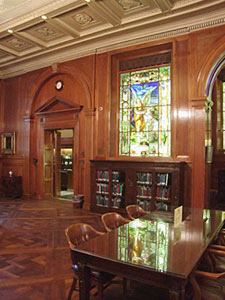
The three oldest stained glass windows in the building were created in 1924 by Haskins Glass Studio, Rochester, New York. These windows were originally installed in the Browning Room in Carroll Library, once Baylor's main library. Today they are mounted along the inner wall of the John Leddy-Jones Research Hall, and are backlit. All three windows are fine examples of pictorial stained glass.
The ten stained glass windows on the outside walls of the room were created by Jacoby Art Glass Company, Saint Louis, Missouri, in a "Munich-style," during the 1948 - 1951 construction of the Library.
All of the windows in this room illustrate Robert Browning's poetry. Please take a moment to enjoy their beauty and to study the accompanying poetry.
Leddy-Jones Research Hall
Haskins Studio, Rochester, New York, 1924
This is one of the three oldest windows in the collection. The image replicates a painting done in 1640 by Guercino (Giovanni Francesco Barbieri, 1591 - 1666) that now hangs in the Civic Museum in the town of Fano, Italy. During the Brownings' visit to the seaside town in 1848, they viewed the painting several times in the little Church of San Agostino. Browning was compelled to write an account of the occurrence in his popular poem, "The Guardian Angel: A Picture at Fano."
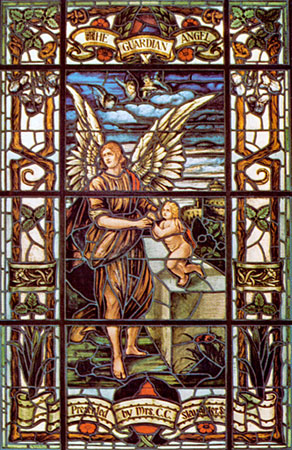
Excerpts from Robert Browning's "The Guardian Angel: A Picture at Fano"
Dear and great Angel, wouldst,
thou only leave
That child, when thou hast
done with him, for me!
O world, as God has made it!
All is beauty:
And knowing this, is love, and
love is duty.
What further may be sought for or declared?
We were at Fano, and three times we went
To sit and see him in his chapel there,
And drink his beauty to our soul's content
--My angel with me too. . . .
Presented by Mrs. C. C. Slaughter, Sr.
Leddy-Jones Research Hall
Haskins Studio, Rochester, New York, 1924
Browning wrote to an American inquirer about this poem: "There is no sort of historical foundation for the poem .... I wrote it under the bulwark of a vessel, off the African coast, after I had been at sea long enough to appreciate even the fancy of a gallop on the back of a certain good horse 'York,' then in my stable at home. It was written in pencil on the fly-leaf of Bartoli's Simboli, I remember."
The poem, published in 1838, tells the story of three riders, the narrator among them, as they ride their horses at top speed from the town of Ghent on their way to Aix to deliver important news for the latter town's survival. The nature of the news is never revealed. The story details are far less important than the sense of movement and sacrifice that permeate the poem.
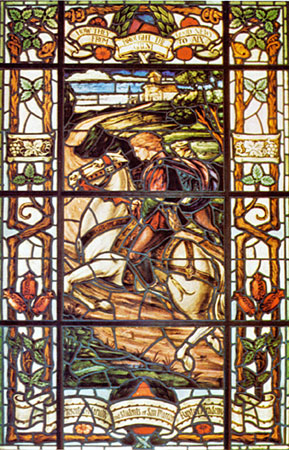
Excerpt from Robert Browning's
"'How They Brought the Good News from Ghent to Aix'"
So, we were left galloping, Joris and I,
Past Looz and past Tongres, no cloud in the sky;
The broad sun above laughed a pitiless laugh,
'Neath our feet broke the brittle bright stubble like chaff;
Till over by Dalhem a dome-spire sprang white,
And "Gallop," gasped Joris, "for Aix is in sight!"
Gift of the Faculty and Students of
San Marcos Baptist Academy
Sturdivant Alcove
Leddy-Jones Research Hall
Haskins Studio, Rochester, New York, 1924
When the "Pied Piper" window was installed in the Browning Room of Carroll Library in 1924, Dr. A. J. Armstrong staged a "Pied Piper Festival" on the Baylor campus. Four hundred Waco school children, dressed in rat costumes (some were white, some gray, some brown, some black), hid in the bushes and doorways of buildings along the historic Quadrangle, and a Baylor student, dressed as the Pied Piper and playing a flute, lured them into a procession around behind the buildings and out of sight of the crowd of spectators. The children then doffed their rat costumes and played out the second half of the story as "children." Thousands came to see the performance and to hear the ceremonies of the dedication of the window. The donor wanted the window to be a reminder of "the sanctity of a promise," as prescribed in the last few lines of the poem.
The window is the focal point of the Sturdivant Alcove of the Leddy-Jones Research Hall.
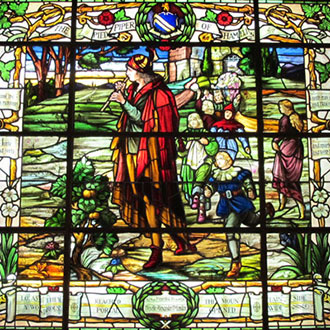
Excerpts from Robert Browning's
"The Pied Piper of Hamelin"
Once more he stept into the street
   And to his lips again
Laid his long pipe of smooth straight cane;
   And ere he blew three notes . . . .
Out came the children running
All the little boys and girls
With rosy cheeks and flaxen curls,
And sparkling eyes and teeth like pearls . . . .
Presented by Moselle Alexander
(Mrs. George) McLendon
Leddy-Jones Research Hall
Jacoby Art Glass Company, Saint Louis, Missouri
In regard to the third verse of this poem the Pall Mall Gazette of 1 February 1890 related this incident: "One evening, just before his death-illness, the poet was reading this from a proof to his daughter-in-law and sister. He said: 'It almost looks like bragging to say this, and as if I ought to cancel it; but it's the simple truth; and as it's true, it shall stand.'"
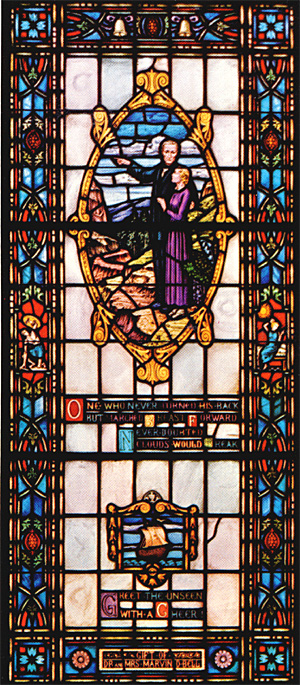
Robert Browning's
"Epilogue" to Asolando
At the midnight in the
silence of the sleep-time,
When you set your fancies
free,
Will they pass to where--by
death, fools think,
imprisoned--
Low he lies who once so
loved you, whom you
loved so,
--Pity me?
Oh to love so, be so loved, yet so mistaken!
What had I on earth to do
With the slothful, with the mawkish, the unmanly?
Like the aimless, helpless, hopeless, did I drivel
--Being--who?
One who never turned his back but marched breast forward,
Never doubted clouds would break,
Never dreamed, though right were worsted, wrong would
triumph,
Held we fall to rise, are baffled to fight better,
Sleep to wake.
No, at noonday in the bustle of man's work-time
Greet the unseen with a cheer!
Bid him forward, breast and back as either should be,
"Strive and thrive!" cry "Speed,--fight on, fare ever
There as here!"
One who never turned his back
but marched breast forward,
Never doubted clouds would break.
Greet the unseen with a cheer!
Gift of Dr. and Mrs. Marvin D. Bell
Leddy-Jones Research Hall
Jacoby Art Glass Company, Saint Louis, Missouri
It is thought that Robert Browning was inspired to write "A Death in the Desert" after reading Ernest Renan's Life of Jesus, translated into English in 1863, a work that questioned the authenticity of John's Gospel. The poem begins with an unnamed speaker sharing the contents of a parchment. The contents convey how the speaker and several others have cared for a dying man, hiding him in a desert cave, soon realizing that the man is St. John himself. Most of the poem that follows is text from John's own dictation.
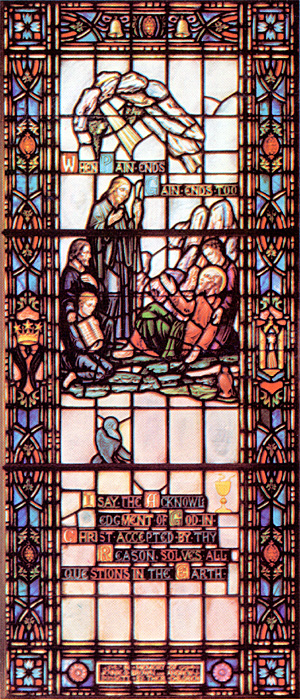
Excerpts from Robert Browning's
"A Death in the Desert"
"Is it for nothing we grow old and weak,
We whom God loves? When pain ends, gain ends too.
"For life, with all it yields of joy and woe,
And hope and fear,--believe the aged friend,--
Is just our chance o' the prize of learning love,
How love might be, hath been indeed, and is;
And that we hold thenceforth to the uttermost
Such prize despite the envy of the world.
And, having gained truth, keep truth: that is all.
"I say, the acknowledgment of God in Christ
Accepted by thy reason, solves for thee
All questions in the earth and out of it,
And has so far advanced thee to be wise.
Wouldst thou unprove this to re-prove the proved?
In life's mere minute, with power to use that proof,
Leave knowledge and revert to how it sprung?
Thou hast it; use it and forthwith, or die!
"For I say, this is death and the sole death,
When a man's loss comes to him from his gain,
Darkness from light, from knowledge ignorance,
And lack of love from love made manifest. . . ."
When pain ends, gain ends too.
I say, the acknowledgment of God in Christ
Accepted by thy reason, solves for thee
All questions in the earth.
In memory of Jennie D. Brown and
Andrew J. Dossett by their children
Gift of Mr. and Mrs. Walter B. Dossett
Leddy-Jones Research Hall
Jacoby Art Glass Company, Saint Louis, Missouri
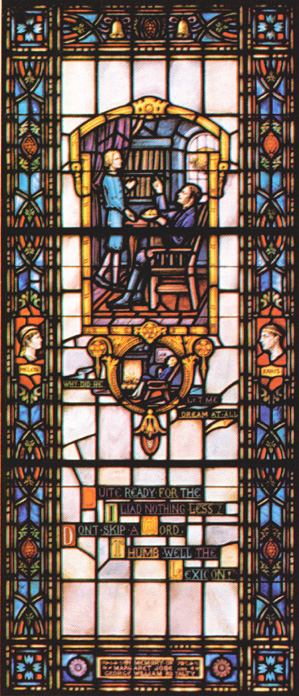
Excerpts from Robert Browning's
"Development"
My Father was a scholar and knew Greek.
When I was five years old, I asked him once
"What do you read about?"
"The siege of Troy."
"What is a siege, and what is Troy?"
Whereat
He piled up chairs and tables for a town,
Set me a-top for Priam, called our cat
--Helen, enticed away from home (he said)
By wicked Paris, who couched somewhere close
Under the footstool, being cowardly. . . .
Time passed, I ripened somewhat: one fine day,
"Quite ready for the Iliad, nothing less?
There's Heine, where the big books block the shelf:
Don't skip a word, thumb well the Lexicon!"
I, now mature man, you anticipate,
May blame my Father justifiably
For letting me dream out my nonage thus,
And only by such slow and sure degrees
Permitting me to sift the grain from chaff,
Get truth and falsehood known and named as such.
Why did he ever let me dream at all,
Not bid me taste the story in its strength?
. . . . . . . . . .
Silence at least was in his power to keep: . . .
Why did he let me dream at all?
Quite ready for the Iliad, nothing less?
Don't skip a word, thumb well the Lexicon!
In memory of Margaret Jobe
and George William Royalty
Gift of Mr. and Mrs. H. R. Edwards
Leddy-Jones Research Hall
Jacoby Art Glass Company, Saint Louis, Missouri
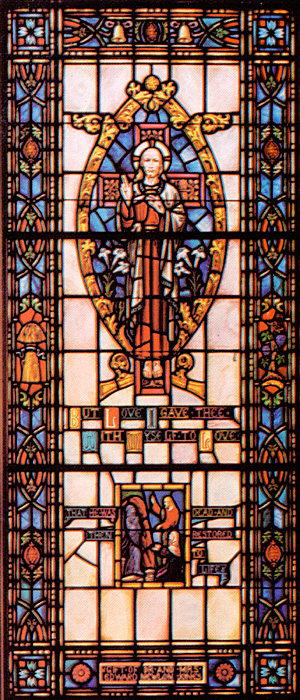
Excerpts from Robert Browning's
"An Epistle, Containing the Strange
Medical Experience of Karshish,
the Arab Physician"
Karshish, the picker-up of learning's crumbs,
. . .
--To Abib, all-sagacious in our art . . . .
'Tis but a case of mania--subinduced
By epilepsy, at the turning-point
Of trance prolonged unduly some three days:
. . .--the man's own firm conviction rests
That he was dead (in fact they buried him)
--That he was dead and then restored to life
By a Nazarene physician of his tribe:
--'Sayeth, the same bade "Rise," and he did rise.
The man--it is one Lazarus a Jew . . . .
This man so cured regards the curer, then,
As--God forgive me! who but God himself,
Creator and sustainer of the world,
That came and dwelt in flesh on it awhile!
--'Sayeth that such an one was born and lived,
Taught, healed the sick, broke bread at his own house,
Then died, with Lazarus by, for aught I know,
And yet was . . . what I said nor choose repeat . . . .
The very God! think, Abib; dost thou think?
So, the All-Great, were the All-Loving too--
So, through the thunder comes a human voice
Saying, "O heart I made, a heart beats here!
Face, my hands fashioned, see it in myself!
Thou hast no power nor mayst conceive of mine,
But love I gave thee, with myself to love,
And thou must love me who have died for thee!"
The madman saith He said so: it is strange.
But love I gave thee, with myself to love.
That he was dead and then restored to life.
Gift of Dr. and Mrs. Edward Newton Jones
Leddy-Jones Research Hall
Jacoby Art Glass Company, Saint Louis, Missouri
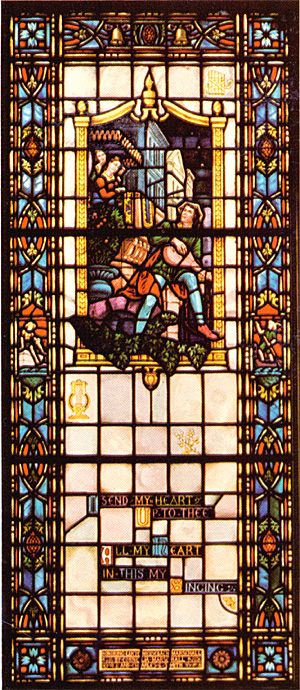
Excerpts from Robert Browning's
"In a Gondola"
He sings
I send my heart up to thee, all my heart
In this my singing.
For the stars help me, and the sea bears part;
The very night is clinging
Closer to Venice' streets to leave one space
Above me, whence thy face
May light my joyous heart to thee its dwelling place.
She sings
The moth's kiss, first!
Kiss me as if you made believe
You were not sure, this eve,
How my face, your flower, had pursed
Its petals up; so, here and there
You brush it, till I grow aware
Who wants me, and wide ope I burst.
The bee's kiss, now!
Kiss me as if you entered gay
My heart at some noonday,
A bud that dares not disallow
The claim, so all is rendered up,
And passively its shattered cup
Over your head to sleep I bow.
I send my heart up to thee, all my heart
In this my singing.
Honoring Lucie Meusebach Marschall
Gift of Cornelia Marschall and Charles G. Smith
Leddy-Jones Research Hall
Jacoby Art Glass Company, Saint Louis, Missouri
One of the earliest of Browning's dramatic monologues, published in 1842, many consider "My Last Duchess" to be his greatest and most famous. The poem is a narration by the Duke of Ferrara to another nobleman and opens as the Duke reveals a portrait of his late Duchess. Through clever use of the monologue, Browning engages his readers in a study of the culture and morality of the Italian Renaissance.
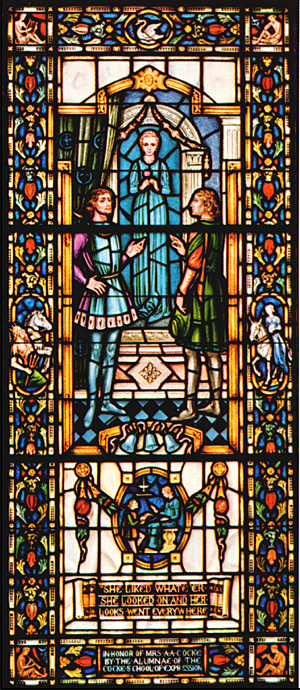
Excerpts from Robert Browning's
"My Last Duchess"
That's my last Duchess painted on the wall,
Looking as if she were alive. I call
That piece a wonder, now: Fra Pandolf's hands
Worked busily a day, and there she stands.
She had
A heart--how shall I say?--too soon made glad.
Too easily impressed: she liked whate'er
She looked on, and her looks went everywhere.
Sir, 't was all one! My favor at her breast,
The dropping of the daylight in the West,
The bough of cherries some officious fool
Broke in the orchard for her, the white mule
She rode with round the terrace--all and each
Would draw from her alike the approving speech,
Or blush, at least. She thanked men,--good! but thanked
Somehow--I know not how--as if she ranked
My gift of a nine-hundred-years-old name
With anybody's gift. . . .
Oh sir, she smiled, no doubt,
Whene'er I passed her; but who passed without
Much the same smile? This grew; I gave commands;
Then all smiles stopped together. There she stands
As if alive. . . .
She liked whate'er she looked on and her
looks went everywhere.
In honor of Mrs. A. A. Cocke
Gift of the Alumnae of the Cocke
School of Expression
Leddy-Jones Research Hall
Jacoby Art Glass Company, Saint Louis, Missouri
This window is an effort to catch the spirit of the scene in which Paracelsus makes known his great, far-reaching aspirations to his young friends. There are bits of symbolism running through the detail of the design which touch on his subsequent life. These add interest to the whole.
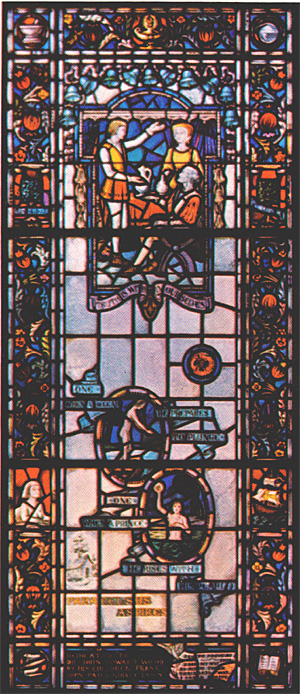
Excerpts from Robert Browning's
Paracelsus (I. Paracelsus Aspires)
Festus
You, if a man may, dare aspire to KNOW:
And that this aim shall differ from a host
Of aims alike in character and kind,
Mostly in this,--that in itself alone
Shall its reward be, not an alien end
Blending therewith; no hope nor fear nor joy
Nor woe, to elsewhere move you, but this pure
Devotion to sustain you or betray:
Thus you aspire.
Paracelsus
I go to prove my soul!
I see my way as birds their trackless way.
I shall arrive! what time, what circuit first,
I ask not: but unless God send his hail
Or blinding fireballs, sleet or stifling snow,
In some time, his good time, I shall arrive:
He guides me and the bird. In his good time!
Truth is within ourselves
One--when a beggar, he prepares to plunge,
One--when, a prince, he rises with his pearl.
I go to prove my soul.
I see my way as birds their trackless way.
I shall arrive!
Dedicated to Dr. John Howard Wood
Gift of Frank, John Paul, and Dixie Lynn Wood
Leddy-Jones Research Hall
Jacoby Art Glass Company, Saint Louis, Missouri
This window depicts the final scene in Browning's poem, Paracelsus, where the deeply moved Festus has arrived at the cell of Paracelsus. He stands by while his old friend reaches the conclusion that Aprile was right and that Love must be added to Knowledge if our service is to be effective. Aprile comes in spirit to lead Paracelsus into Eternity.
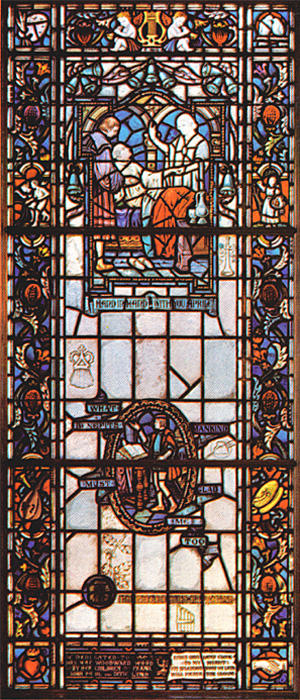
Excerpts from Robert Browning's
Paracelsus (V. Paracelsus Attains)
Festus
God! Thou art love! I build my faith on that.
Even as I watch beside thy tortured child
Unconscious whose hot tears fall fast by him,
So doth thy right hand guide us through the world
Wherein we stumble.
Paracelsus
In my own heart love had not been made wise
To trace love's faint beginnings in mankind,
To know even hate is but a mask of love's,
To see a good in evil, and a hope
In ill-success; to sympathize, be proud
Of their half-reasons, faint aspirings, dim
Struggles for truth, their poorest fallacies,
Their prejudice and fears and cares and doubts;
All with a touch of nobleness, despite
Their error, upward tending all though weak,
Like plants in mines which never saw the sun,
But dream of him, and guess where he may be,
And do their best to climb and get to him.
All this I knew not, and I failed. Let men
Regard me, and the poet dead long ago
Who loved too rashly ; and shape forth a third
And better-tempered spirit, warned by both: . . .
Hand in hand with you, Aprile!
What benefits mankind must glad me too.
I press God's lamp close to my breast;
Its splendor, soon or late,
Will pierce the gloom.
Dedicated to Mrs. Mae Woodward Wood
Gift of Frank, John Paul, and Dixie Lynn Wood
Leddy-Jones Research Hall
Jacoby Art Glass Company, Saint Louis, Missouri
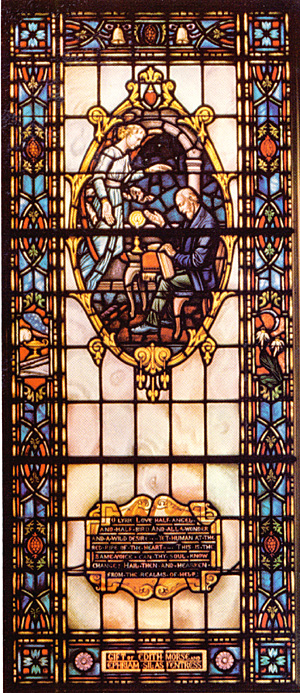
Excerpt from Robert Browning's
The Ring and the Book, I, "O Lyric Love"
O lyric Love, half angel and half bird,
And all a wonder and a wild desire,--
Boldest of hearts that ever braved the sun,
Took sanctuary within the holier blue,
And sang a kindred soul out to his face,--
Yet human at the red-ripe of the heart--
When the first summons from the darkling earth
Reached thee amid thy chambers, blanched their blue,
And bared them of the glory--to drop down,
To toil for man, to suffer or to die,--
This is the same voice: can thy soul know change?
Hail then, and hearken from the realms of help!
Never may I commence my song, my due
To God who best taught song by gift of thee,
Except with bent head and beseeching hand--
That still, despite the distance and the dark,
What was, again may be; some interchange
Of grace, some splendor once thy very thought,
Some benediction anciently thy smile:
--Never conclude, but raising hand and head
Thither where eyes, that cannot reach, yet yearn
For all hope, all sustainment, all reward,
Their utmost up and on,--so blessing back
In those thy realms of help, that heaven thy home,
Some whiteness which, I judge, thy face makes proud,
Some wanness where, I think, thy foot may fall!
O lyric Love, half angel and half bird,
And all a wonder and a wild desire,--
Yet human at the red-ripe of the heart--
This is the same voice: can thy soul know change?
Hail then, and hearken from the realms of help!
Gift of Edith Morse and Ephriam Silas Fentress
Leddy-Jones Research Hall
Jacoby Art Glass Company, Saint Louis, Missouri
Sordello, a narrative study in the psychology of genius and the development of a soul, is considered one of the most obscure of Browning's works and was a critical failure when published in 1840. It is a fictionalized account of the life of Sordello da Goito, a 13th-century troubadour. The setting of northern Italy is dominated by the struggle between the Guelphs (partisans of the Pope) and the Ghibellins (partisans of the Holy Roman Emperor). Sordello is a Ghibelline. The poem reveals the troubles of its subject, who is torn between the practical and the sublime, between the demands of his poetic imagination and his involvement in the power and glory of politics.
In this window, the dramatic scene depicts Palma and Taurello as they have made known their relationship and are leaving Sordello to his great and fatal spiritual struggle. The small medallion in the top border is a likeness of Shelley. The clothing, hair styles, furniture, and armor are all correct for the period.
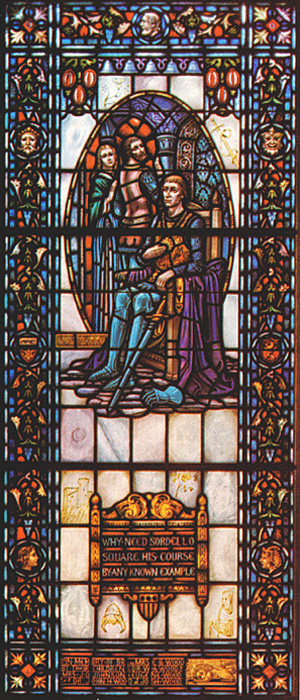
Excerpts from Robert Browning's
Sordello
Book the Sixth
Whereas for Mankind springs
Salvation by each hindrance interposed.
They climb; life's view is not at once disclosed
To creatures caught up, on the summit left,
Heaven plain above them, yet of wings bereft:
But lower laid, as at the mountain's foot.
So, range on range, the girdling forests shoot
Twixt your plain prospect and the throngs who scale
Height after height, and pierce mists, veil by veil,
Heartened with each discovery; in their soul,
The Whole they seek by Parts-- . . .
Here is the Crowd, whom I with freest heart
Offer to serve, contented for my part
To give life up in service,--only grant
That I do serve; if otherwise, why want
Aught further of me? If men cannot choose
But set aside life, why should I refuse
The gift? I take it--I, for one, engage
Never to falter through my pilgrimage--
Nor end it howling that the stock or stone
Were enviable, truly: I, for one,
Will praise the world, you style mere anteroom
To palace--be it so!
Why need Sordello square his course
By any known example?
In memory of Dr. and Mrs. E. B. Wood
Gift of Dr. W. A. Wood, Mrs. J. D. Johnson,
Eugene Wood, Dr. John H. Wood, and Josh Wood